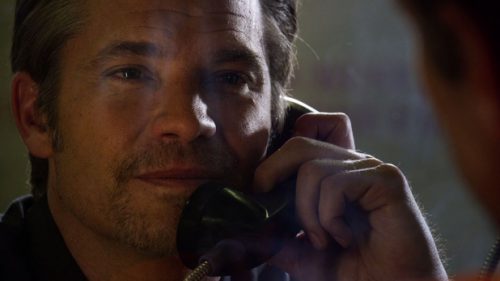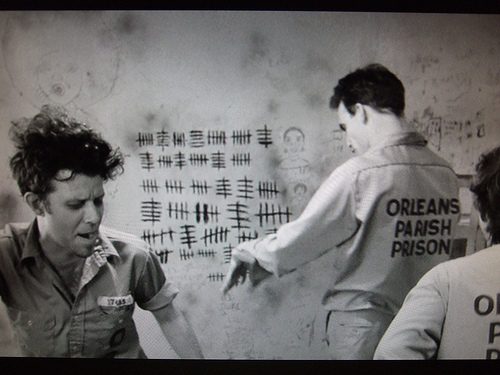
Before even beginning this post, you probably noticed the one giant, smug asterisk that naturally attached itself to the title: *Oh goodness, that’s right. Can’t believe I forgot to tell you! I do jail ministry. NBD. I’d love to, you know, grab a beer and tell you more about it sometime…
Let me alleviate any forespoken superiority with a quick rejoinder: God did not equip me with enough confidence to throw “successful tips” out about much, and definitely not about doing jail Bible studies. I do not have tips. I am a “sensitive” guy, which does not exactly disqualify me from jail ministry, but it does mean that many of my emotional moments with inmates tend to get “lost in translation,” if you know what I mean. I am an oversharer. It’s safe to say I have embarrassed myself more than I have helped others. Just a month ago, I was leading a women’s Bible study (mistake #1) with my wife (mistake #2) about mixed signals we get from God. I told the women a story about when an old girlfriend used God’s will as an excuse to dump me (#3). (Everyone’s experienced that, right?) I thought it was a great illustration of a tough Christian truth—they thought it was hysterical. The entire hour-long Bible study was lost because every time I opened my mouth, the women began cackling again. One of them even said, twenty minutes after my illustration, “Even if that happened to you, why would you share it?”
So, keeping that in mind, here are some ruthless reminders from a year in jail ministry. Ironically—and because God has a sense of humor—the jail is actually one of the best churches I’ve been to in a long time.
1. Inmates are you and me. I thought the initial shock of jail ministry would be my exposure to ‘monsters’—real bad-boy criminals hardened by a life much different from mine. I half expected I’d need to be ‘tougher’ than I was when I went in; the jail training seminars told us we’d need to be on guard for under-the-table negotiations, on guard against inappropriate requests. Instead, the real shock had everything to do with our similarity. We are routinely astounded by the number of people in jail we have actually known from outside of jail. In just a year’s time, we’ve had high school classmates, a former bassist in someone’s band, well-heeled members of our church community, friends of friends. Nothing has been more shocking than the revelation that one bad day separates a button-down from a jumpsuit. Time and again, our Bible study talks about this, that nothing but the outfit separates us from them.
At the same time, though, I have had to confront my own discomfort with that revelation. In church on Sunday, at least at our church on Sunday, it is immensely easy to equate our membership with some modicum of predictable decency. It is normal to do this, regardless of your theological inclinations. But I’ve never noticed how profoundly subtle is the draw to see my tribe in the human race as a circle of considerate, honest, and basically good people. Which is to say two things: first, that every “shirty Episcopalian” (Capon) in our pews every Sunday has a subterranean life you do not see. And second, that I am—and you are—an inveterate believer in a ‘high’ anthropology, no matter what I say on paper.
Going into the jail is a quick, blessed reminder that your fantasies of moral certitude are as flimsy as the bristles of your toothbrush. Strangely enough, this somehow feels good.
2. Ministry is at its best when it is operating repeatedly—frustratingly—on the first floor. We lead Bible studies at the regional jail, which means that the inmates there are either awaiting their sentencing or trials before they are sent to the prison, or their sentences are on the shorter side. This means that every week, our group loses familiar faces and adds new ones. Every week, we re-enter the awkward icebreaker routine of going around the table with our names and something about us (our favorite summer memory, our favorite place in the world, our biggest fear as a kid, etc.). And every week, whether we like it or not, our group dynamic is dependent upon characters we haven’t even imagined yet.
This certainly keeps things interesting, and maddening. Last week’s emotional breakthrough with Alvin is as gone as Alvin is—very gone. Instead you are sitting in the same room, with two new guys—one who seems not to speak English, the other who turns out to be Mormon—wondering why the hell you ever signed up for something this awkward. You’re able to rest on your laurels exactly as long as the car ride out.
What this means is that there is no empire-building in jail ministry. You are saved from the delusions of what a ‘successful’ ministry might say about you. Thankfully, this is what we believe church ought to be about—returning over and over to ground zero. While the institutional church will find innumerable ways to mire itself in its own legacy, we believe the church works best in a state of cruciform monomania. When we have no earthly idea who is going to show up, and we have no earthly idea what kind of hell any one person is bringing with them into the room, the only thing that makes sense to talk about is the main thing: the cross.
3. When you have been brought to nothing, you are on holy ground. As much as we hate the experience ourselves, as little as it does to mitigate the pain involved, it is no less true that “God’s office is at the end of your rope.” Just last week a woman told us that her issues with anger have been addressed by God—in jail of all places. “Who knew, living with and sleeping in the same room as a bunch of crazy convicts, that I’d learn to be patient with them? And to be patient with myself?” She was floored. Another man told us smiling that, during his first week of incarceration, he lost his apartment, his car, his clothes and his savings. Everything was gone. There was no mistaking it: he was relieved! He told us that when he got out he’d have no other choice but to start over. This is what the theology of the cross is all about: God’s saving power proven in death.
I’m no Pentecostal, but in jail, I have felt the anointing presence of the Holy Spirit. In this way—which I have to say is a selfish way—I have been ministered to more than I ever thought. Reticent, sheepish sensitive male that I am, it has made me less fearful. If God has shown himself in this terrible place, he must be in all terrible places—all the other ones I occupy throughout my week. You can run through the litany of scary places you’ll one day inhabit and say to yourself, “Yes, even here.”
4. Which leads me to one of the most salient lessons I keep on having to re-learn: while a theology of grace is a “Yes, even here” in a world that loves to say “Not here,” I am so quick to turn God’s “Yes” into a “No” by talking about it. In other words, by becoming a theological lecturer. I am learning—over and over again—that theology is first and foremost pastoral, that the content of the theology will always trump the teaching of it. In other words, a theologian of grace is a caretaker of the “Yes” of God—which means, from time to time, he’d do better to shut up and listen.
In our experience at the jail, many of the most remarkable insights have come from simply listening and not teaching. This sounds obvious, but it is supremely difficult when most of what you wade through is muddled thinking and bad theology. What we often forget, though, is the theological wisdom of presence. This is as true for an inmate as it is for any of us. Anyone whose day is monotonized by orders and directives is given God’s grace when he or she can say anything (or nothing) at all.
A couple weeks back, we had a Bible study that I thought was going terribly. Only three women had come, and each question or comment we made about the text at hand, were met with quick, detached answers. Conversation was going nowhere. Our hope to bring the text into their lives—to make it real for them—wasn’t exactly met with aversion so much as boredom. The litany of inner-accusations began: What are you doing here? You have nothing to say to them. Some Bible study! Suddenly, though, the clouds parted. During one of the awkward silences, Kayla sighed deeply and slouched in her chair, and said, “I like this Bible study. I feel like I can breathe in here.” She explained to us that the other Bible studies she’d gone to in jail felt like there was a constant “tension in the air.” What was with that? It was only then that we were able to actually talk about theology.
5. The tension our friend Kayla felt, that frankly most inmates feel in a Bible study in jail, is due to the fact that the brand of Christianity predictably preached in jail is behavior modification. Nowhere is the “tough love” language of the Law more staunchly situated than with those behind bars. You would think that a place with such trenchant recidivism would be glad to point out the friend of sinners. Sadly, they are met instead with the opposite—Jesus the Lifecoach.
Our city’s jail actually has a “Discipleship Block,” a jail cell for a chosen number of Christians who want to seriously recommit their lives. Inmates must earn their way in. Once in, they spend their day within a cell full of re-committed Christians, memorizing scripture together, watching old Bible movies, doing Bible curriculum. (To me, that sounds like the seventh circle of you-know-where, but you know, potato, patata.) Everything, from the hellfire literature handed to inmates, to the prognoses handed them by society, is cribbed in the same conditionality that put them there. Christianity becomes synonymous with moral quid pro quo.
If that sounds cynical, it’s because I am to some degree. At the same time, who am I kidding? I intimately know the urge; in life’s moments of shame, I vow to improve. I make plans for the future. I thank God very much for his grace, but I know I need to show the fruits of repentance this time around. The real News we come to bring to the jail—that Christ is the fulfillment of the Law—is the very last thing I, too, come to accept along a long road of “tough love.” And, would that it weren’t so, I get back on that road again and again.
Thankfully, though, seeing this need in ourselves—for something softer than tough love—is more than enough to be a good minister, jail or otherwise. More than Bible wisdom, more than theology savvy, more than a pastoral demeanor, the only experience necessary is your experience…of being a person! No one has left a Bible study because we didn’t know the answers to their questions. Similarly, no one has left a Bible study because we didn’t have the right music, or the right liturgy, or ample life application stories. A human being living in the midst of his or her demons, held all the while in the steadfast and endless grace of God. Somehow, the simplicity of this ministry still has legs.

COMMENTS
11 responses to “Tough Love Lessons in a Year of Jail Ministry”
Leave a Reply


















SO INTERESTING, ETHAN! This resounds on many more levels than just prison ministry.
What’s that phrase again? “This is EVERYTHING.” #ekrimh
Damn, Ethan. This is so good. From a fellow cynic and person who thinks the “Discipleship Block” sounds closer to the Upside Down than to heaven.
Also, what perfect images! (Poor Nasir…)
Add this to the canon of classic M’bird posts. Congrats, Ethan! “Some Bible Study!” (I laughed out loud when I read it.)
Spot on. Thanks for sharing. I have linked this to my website, http://www.amyrognlie.com on my jail/prison ministry page. I think it would be good for all of us who work in this field to hear someone else’s perspective and know that we’re not the only one who has felt those same things!
Hello!
I am a 21 year old woman going to work in a men’s prison as a chaplain’s intern this summer. I have never even been inside of a prison. I am so out of my element.
This article actually helped me a lot. My goal is not to be wise or prepared or experienced, but rather just the most willing disciple possible. This helped me know how to be willing.
Thank you!